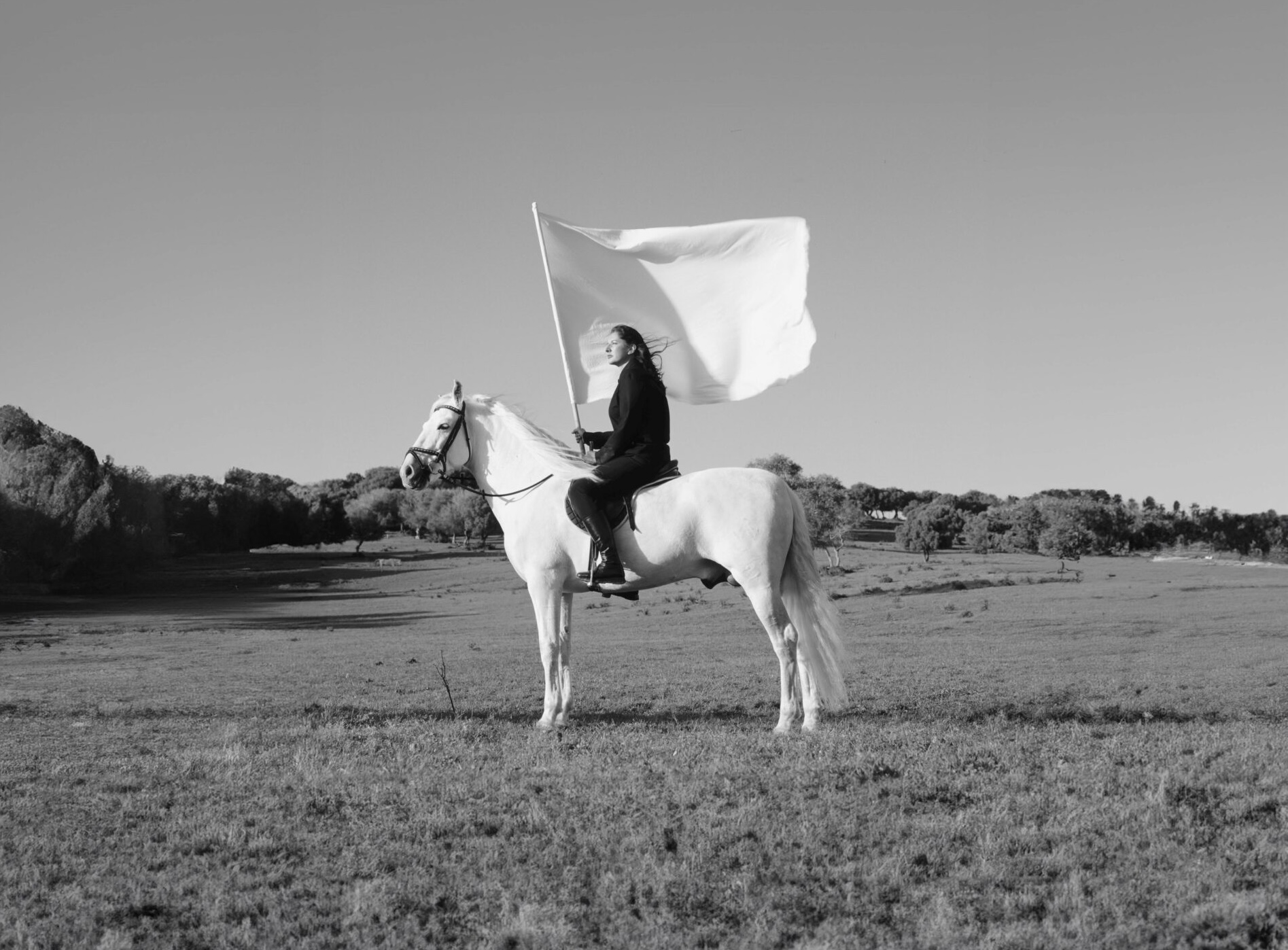

_Fleshing out the shadow women of a male-dominated literary culture._
---------------------------------------------------------------------
Shortly into Ernest Hemingway’s _A Moveable Feast_, the narrative alights on a girl seated alone in a cafe: “She was very pretty with a face fresh as a newly minted coin if they minted coins in smooth flesh with rain-freshened skin, and her hair was black as a crow’s wing and cut sharply and diagonally across her cheek. I looked at her and she disturbed me and made me very excited. I wished I could put her in the story, or anywhere, but she had placed herself so she could watch the street and the entry and I knew she was waiting for someone. So I went on writing.”
He plods on, making marks on paper, but it’s only a matter of several lines before he returns his attention to the disturbing, exciting Parisienne: “I’ve seen you, beauty, and you belong to me now, whoever you are waiting for and if I never see you again, I thought. You belong to me and all Paris belongs to me and I belong to this notebook and this pencil.”
When I read this book for the first time, I identified with the girl in my aspiration to be a silent, mysterious, captivating cameo on the reel of a genius’s mind. But upon my second and third readings, I noted three things. First, his embarrassing, misogynistic assertion of ownership over the object of his admiration. Second, the extension of his claim from the girl to the whole of Paris. And third, how in the next paragraph he looks up and the girl is gone, and he assumes she’s left with a man, hopefully “a good man.”
But where did she go? And with whom, if anyone? _A Moveable Feast_ is a sad book, not only for its accounts of blind hope and self-destruction, but for scenes like this one, which now evokes an amusing misunderstanding: Hemingway’s assumption (the one so many patriarchal men make) that this girl and this city belong to him, when in fact it is the girl who has Paris, who can go anywhere and do anything, alone or in the company of anyone she chooses, good or not. Hemingway is caught in a web of storytelling—about himself, about the city and its residents—that is intrinsic to novel-writing or journal-keeping or meaning-making. The idea of place merges with the idea of who and what one is, or could be, in the context of that place. I live 3,625 miles from Paris, France, my idea of which has been built upon literary foundations, as opposed to real-life experience, and so my fantasies of it are that much stronger than my fantasies of, say, Los Angeles, California, where I have spent a little time, and from which I live 2,791 miles. And yet my imagination uses them both to similar ends: to conjure up new ways of being.
In New York, where I live, I am only ever my plain self. All the places I am not are imbued with a particular glow, like geographical incubators for the selves I have not realized. In New York, I rarely feel like the secretly powerful girl in the cafe; mostly I feel uncomfortable in body and distracted in mind, unsexy, moody, bad with money.
There is the Paris as it exists geographically, topographically, politically, economically, culturally, and then there is the Paris of my imagination.
In the Paris of my imagination, I am someone who can go anywhere and do anything, alone or in the company of anyone she chooses, good or not. I am angular, graceful, effortlessly stylish. I simply have money, and I know what to do with it. I am an intellectual, and the acuity of my intellect is so highly recognized and valued that I need not do anything except walk and think, or sit and think, or recline and think. I drink coffee—which my New York esophagus rejects—from morning until night, never suffering caffeine-induced anxiety or adrenal fatigue. In the Paris of my imagination, every bad feeling that arises is put to good use in a poem or a painting or a philosophical treatise, and then shed like a skin. Even a heartbroken Sylvia Plath found equanimity there:
“Dried tears, patted poodle, & asked where could find restaurant; wandered through fruit stalls in Champ-de-Mars through flowers & crowds bearing palm sprays (but all green small sprigs of leaves) and found large Brasserie...Ordered Assiette Anglaise and coffee (which came black & sour) and read Anouilh’s _Antigone_, that magnificent part the chorus does about tragedy. Gradually, amazingly, a calm stole over me. A feeling that I had as much right to take my time eating, to look around; to wander & sit in the sun in Paris as anyone; even more right. I felt downright happy when I ordered another cup of coffee with cream & it was much better.”
In the Paris of my imagination, I collapse time and space and all the particulars of physics, and see Sylvia as the girl in Hemingway’s cafe, sitting there calmly, downright happy, taking her time, looking around, wandering, and rightfully so.
Like any living organism, a place is continuously constructed and reconstructed on a cellular level. It is never static or finalized; it boasts architecture and systems and monuments and history, but it can never be hermetically sealed off to the perceptions of its inhabitants or its visitors, in life or in dreams.
During bouts of depression, I have hated cities that had been magical to me in times of relative happiness. I have thought, _This is a bad town, it drives people crazy, the weather is evil_, when in fact it was the weather of my life that had taken a turn.
I occasionally consider moving to Los Angeles. One of my hesitations has to do with the seasons, or lack thereof. I think of it as a place where the elements shift in either very subtle or very dramatic ways, with a kind of paralyzed brightness in between. I think of it as a place on the verge of burning or drowning, whichever disaster strikes first.
I learned about the Santa Ana winds from Joan Didion’s _Slouching Towards Bethlehem_: “There is something uneasy in the Los Angeles air this afternoon, some unnatural stillness, some tension...I have neither heard nor read that a Santa Ana is due, but I know it, and almost everyone I have seen today knows it too. We know it because we feel it...To live with the Santa Ana is to accept, consciously or unconsciously, a deeply mechanistic view of human behavior.”
BusinessDictionary.com describes mechanistic as “a viewpoint that states that the behavior of complex systems, such as individuals, societies, and economies, are determined strictly by the interaction of the parts or factors of which they are composed. Mechanistic theories are in opposition to philosophies such as vitalism, which claim that the behavior of a system is influenced by a separate or external quality, such as the ‘spirit’ of a nation or the ‘mood’ of an economy.”
If we are to assume Didion means mechanistic in this particular way, we would have to consider the possibility that it is being misused, since to say that the Santa Ana winds have any influence at all on a person’s consciousness would be to say that the external has penetrated the internal. On the other hand, we might read this as a suggestion that the Santa Ana winds and the people of Los Angeles are not and have never been separate—that the place and the people are interactive parts of overlapping networks of form and function.
There is the Los Angeles as it exists geographically, topographically, politically, economically, culturally, and then there is the Los Angeles of my imagination.
When I imagine myself in Los Angeles, I am someone who can go anywhere and do anything, alone or in the company of anyone she chooses, good or not. I imagine my interior space being gladly penetrated by the exterior. I imagine my insides—my thoughts, my emotions, my metabolism—transformed by the environment.
My Los Angeles self is tall, long-haired, thin but muscular. Tan but at zero risk of skin cancer. Satiated by sprouts and cucumbers. Acceptably stoned. Down-to-earth canyon priestess with an impressive library _and_ a formidable crystal collection. I own a bungalow, keep a garden, care for cats and dogs. I attend parties and I give them, free of the introvert loner tendencies I maintain so well in the East Coast metropolis of my reality.
_Sweet Valley High_, _Clueless_, _Less Than Zero_, _Chinatown_, _Mulholland Drive_, Joni Mitchell, the Manson family. This source material provides a manic textual array with which I can collage a Bosch-esque dreamscape: vapid teens, casual drug use, speeding cars, sinister subplots, nonlinear noir, solitude, homicidal devotion, the fornication of nature and psyche.
When I was 19, I became interested in Nathan Weinstein, who began calling himself Nathanael West during a three-month visit to Paris. West later moved to Hollywood and worked as a screenwriter, but it wasn’t until after he died (car accident, El Centro) that his strange novellas (_Miss Lonelyhearts_, _The Day of the Locust_, _The Dream Life of Balso Snell_) went into wider circulation. _The Day of Locust_ critiques the very industry that provided West his livelihood, turning the idealized golden age of cinema on its head through a series of grotesque vignettes. One of the most thrilling aspects of fantasy is its dismantling.
An expert in the construction and deconstruction of fantasy, in life and in art, was Hemingway’s contemporary, F. Scott Fitzgerald, who died in Hollywood after a series of ailments and a final, fatal heart attack. He and his wife, Zelda, are subjects of great concern in Hemingway’s _A Moveable Feast_, principally for their heavy drinking: “Scott would resolve not to go on all-night drinking parties and to get some exercise each day and work regularly...he would sweat out the alcohol on long walks with me, and make up his mind that this time he would really work, and would start off well. Then it would start all over again.”
We can’t know how Fitzgerald imagined himself in Paris, what he reckoned himself capable of in terms of his writing or his marriage or his alcoholism, and we can’t know how he believed that would all change—or not—when he moved to California in 1926, and then again in the mid-1930s (after committing Zelda to the psychiatric facility where she would later die). But the short stories written in the years before his death suggest a deep sense of disenchantment with the person he had become, or had kept on being, in the land of sunny redemption.
Wherever we are, there is always the fact of the body, its limitations, its demands. This body—not angular, not graceful, not tall, not long-haired, not quite thin nor muscular, not satiated by sprouts, rarely tan or stoned or fueled by immaculate coffee—can only ever be in one place at one time, and yet this mind cavorts in multitudes. It beckons me back—_if only I had_—and forth—_maybe if I_.
Resistance to the real, no matter how acceptable and satisfying it might be, is one of its most deeply etched grooves.
Los Angeles and Paris are, for me, dual symbols of excess and austerity. Lack of water and shade contrasted by copious light and heat, endless beach, abundant intoxicants, vigorous health; or, the voluptuous and the grand—food, art, film, architecture—balanced by almost haughty restraint. These broad strokes could be entirely off the mark; the only intimacy I have with either place is through the lens of my own desire, the projections of my own unfulfilled, displaced fantasies, and the desires and fantasies of others.
But when we transpose our make-believe selves onto place, we usually imagine this marriage as easier, better, more interesting, more adventurous, more joyful. We take the _if only I had_ to its most pleasurable conclusion. This is not to say we don’t also look back and think, _thank god I didn’t_ or _how stupid I was to_. The _there_ is key—in the _there_ we are able to hash out all permutations without consequence.
For example, when I lived in Portland, Oregon, for one miserable year, I actively pursued a job opportunity in rural Argentina, where I would have, ostensibly, acted as assistant and transcriptionist to an aging equestrian eager to write her memoirs. Over the course of several months and many emails, after a slew of red flags and bad omens, I was overwhelmed by the realization that my desire to leave Portland, after having identified it as the root of everything that had gone awry in my life, was so strong that I had simply transferred the same feelings of hope and renewal that had caused me to move to Portland in the first place to this unnamed, unseen region of South America. At the time, I harbored elaborate fantasies of what and who I would be there, but I’ve forgotten them now.
Rifling through identities—pretending—is a convenient, addictive method of dissociation. I have been doing it since I was small. I became fluent in the language of nostalgia-for-what-could-have-been or what-still-could-be by listening to the coded conversations between adults, and Paris was one of the first places I associated with this secret subtext of longing.
At the age of 17, my mother lived in Paris for 18 months. It is the experience she mentions most frequently, a singular touchstone in her fifty-five years on earth. She grew up on Long Island, like me, and she returned there after her year-and-a-half in France. At some point I began to understand that her repeated stories of Paris were articulations of the refrain _if only I had_. “I always imagined if I’d stayed in Paris,” she writes, “the Sorbonne would have been my _lieu d’étude_, my French would have been superb, and my life as a food critic and award-winning chef would have been outstanding. The little French bistro would have been mine, with a view of the Eiffel Tower and beautiful fountains below. A romantic, serene, and delicious life.”
Our lives are made up partly of what happened, and partly of what could have happened or what might happen. Sometimes I am startled by the vividness of my alternate universes, the clarity with which I can see and hear and feel what it would be to wake up in a sun-dappled room in a charmingly ugly lavender stucco house tucked away in a copse of exotic flora. I have equal access to the panoramic view of a life like the one my mother describes, albeit substituting literature for food, and zooming in on the details: a prewar apartment, dainty flatware, plain black shoes, the rhythm of my gait over cobblestone streets, my hair cut sharply and falling diagonally across my cheek, the energetic ease with which I drop into a cafe, take my time, look around, and wander. It is as though these are not merely scenes from a hypothetical life but ruptures of past lives into present, or premonitions of possible futures.
Would have, could be. _If only I had_, _maybe if I_. French psychoanalyst Jacques Lacan stated that “desire is neither the appetite for satisfaction nor the demand for love, but the difference that results from the subtraction of the first from the second.” According to my lay reading of Lacan’s equation, the merging of my fantasy selves with their associated dwellings cannot be achieved; their survival relies upon the impossibility of their actualization.
The Los Angeles of my imagination is necessarily unreal. The sunshine is there, yes, and the 18.5 million people and their palm trees and boulevards. There really are mountain lions and surfers and New Age cults. But the Los Angeles me, she isn’t there. She is a hologram eluding detection.
Desire breeds lack, lack breeds desire. I can long for the gaudy glamour of Los Angeles or the sturdy elegance of Paris, but the longing itself is what gives me something to chew on, to knead.
The Paris of my imagination is a book written about a person the author has never met—I can glean some secondhand sense of her but I know nothing of her smell or her texture or her moods. The river is there, and the 12.4 million people and their buildings and arrondissements. There really are catacombs and cigarettes and brasseries. But the Paris me, she was never born. She is a cascade of fireworks in the circuit board of my brain, kept burning by the eternal return to the bookends of the human condition: _if only I had_, _maybe if I_.
“There is never any ending to Paris.” So begins the final chapter of _A Moveable Feast_, which was published three years after Hemingway took his own life by firearm in Ketchum, Idaho. He began writing the memoir after recovering a steamer trunk “filled with a ragtag collection of clothes, menus, receipts, memos, hunting and fishing paraphernalia, skiing equipment, racing forms, correspondence, and on the bottom, something that elicited a joyful reaction from Ernest: ‘The notebooks! So that’s where they were! Enfin!’” _Finally_.
I like to think that we are all hauling around our own steamer trunks, heavy with meaningful traces of the lives we’ve lived and not lived. I want to believe that when we nurture private or expressed imaginings—of place, of others, of ourselves—we play with the finite, the mortal. Fantasy makes us good readers and writers, good cinema-goers and makers, good conscious humans.
But what we simultaneously avoid confronting and hurtle toward headlong in our fits of fantastical rumination is our dead end. We are taught to want and go after and eventually acquire everything. We are told that no aspiration is off the table, no place is forbidden, no ambition too great. But we can’t have it all. If my mother had, for instance, stayed in Paris, I would not be alive. We cannot be all the people we’ve ever wanted to be; we can barely manage to fully be our singular self. Eventually we die having experienced only as much as our one particular life can hold, to the exclusion of everything else.
* * *
**Written by** Melanie Jane Parker
 
_Fleshing out the shadow women of a male-dominated literary culture._
---------------------------------------------------------------------
Shortly into Ernest Hemingway’s _A Moveable Feast_, the narrative alights on a girl seated alone in a cafe: “She was very pretty with a face fresh as a newly minted coin if they minted coins in smooth flesh with rain-freshened skin, and her hair was black as a crow’s wing and cut sharply and diagonally across her cheek. I looked at her and she disturbed me and made me very excited. I wished I could put her in the story, or anywhere, but she had placed herself so she could watch the street and the entry and I knew she was waiting for someone. So I went on writing.”
He plods on, making marks on paper, but it’s only a matter of several lines before he returns his attention to the disturbing, exciting Parisienne: “I’ve seen you, beauty, and you belong to me now, whoever you are waiting for and if I never see you again, I thought. You belong to me and all Paris belongs to me and I belong to this notebook and this pencil.”
When I read this book for the first time, I identified with the girl in my aspiration to be a silent, mysterious, captivating cameo on the reel of a genius’s mind. But upon my second and third readings, I noted three things. First, his embarrassing, misogynistic assertion of ownership over the object of his admiration. Second, the extension of his claim from the girl to the whole of Paris. And third, how in the next paragraph he looks up and the girl is gone, and he assumes she’s left with a man, hopefully “a good man.”
But where did she go? And with whom, if anyone? _A Moveable Feast_ is a sad book, not only for its accounts of blind hope and self-destruction, but for scenes like this one, which now evokes an amusing misunderstanding: Hemingway’s assumption (the one so many patriarchal men make) that this girl and this city belong to him, when in fact it is the girl who has Paris, who can go anywhere and do anything, alone or in the company of anyone she chooses, good or not. Hemingway is caught in a web of storytelling—about himself, about the city and its residents—that is intrinsic to novel-writing or journal-keeping or meaning-making. The idea of place merges with the idea of who and what one is, or could be, in the context of that place. I live 3,625 miles from Paris, France, my idea of which has been built upon literary foundations, as opposed to real-life experience, and so my fantasies of it are that much stronger than my fantasies of, say, Los Angeles, California, where I have spent a little time, and from which I live 2,791 miles. And yet my imagination uses them both to similar ends: to conjure up new ways of being.
In New York, where I live, I am only ever my plain self. All the places I am not are imbued with a particular glow, like geographical incubators for the selves I have not realized. In New York, I rarely feel like the secretly powerful girl in the cafe; mostly I feel uncomfortable in body and distracted in mind, unsexy, moody, bad with money.
There is the Paris as it exists geographically, topographically, politically, economically, culturally, and then there is the Paris of my imagination.
In the Paris of my imagination, I am someone who can go anywhere and do anything, alone or in the company of anyone she chooses, good or not. I am angular, graceful, effortlessly stylish. I simply have money, and I know what to do with it. I am an intellectual, and the acuity of my intellect is so highly recognized and valued that I need not do anything except walk and think, or sit and think, or recline and think. I drink coffee—which my New York esophagus rejects—from morning until night, never suffering caffeine-induced anxiety or adrenal fatigue. In the Paris of my imagination, every bad feeling that arises is put to good use in a poem or a painting or a philosophical treatise, and then shed like a skin. Even a heartbroken Sylvia Plath found equanimity there:
“Dried tears, patted poodle, & asked where could find restaurant; wandered through fruit stalls in Champ-de-Mars through flowers & crowds bearing palm sprays (but all green small sprigs of leaves) and found large Brasserie...Ordered Assiette Anglaise and coffee (which came black & sour) and read Anouilh’s _Antigone_, that magnificent part the chorus does about tragedy. Gradually, amazingly, a calm stole over me. A feeling that I had as much right to take my time eating, to look around; to wander & sit in the sun in Paris as anyone; even more right. I felt downright happy when I ordered another cup of coffee with cream & it was much better.”
In the Paris of my imagination, I collapse time and space and all the particulars of physics, and see Sylvia as the girl in Hemingway’s cafe, sitting there calmly, downright happy, taking her time, looking around, wandering, and rightfully so.
Like any living organism, a place is continuously constructed and reconstructed on a cellular level. It is never static or finalized; it boasts architecture and systems and monuments and history, but it can never be hermetically sealed off to the perceptions of its inhabitants or its visitors, in life or in dreams.
During bouts of depression, I have hated cities that had been magical to me in times of relative happiness. I have thought, _This is a bad town, it drives people crazy, the weather is evil_, when in fact it was the weather of my life that had taken a turn.
I occasionally consider moving to Los Angeles. One of my hesitations has to do with the seasons, or lack thereof. I think of it as a place where the elements shift in either very subtle or very dramatic ways, with a kind of paralyzed brightness in between. I think of it as a place on the verge of burning or drowning, whichever disaster strikes first.
I learned about the Santa Ana winds from Joan Didion’s _Slouching Towards Bethlehem_: “There is something uneasy in the Los Angeles air this afternoon, some unnatural stillness, some tension...I have neither heard nor read that a Santa Ana is due, but I know it, and almost everyone I have seen today knows it too. We know it because we feel it...To live with the Santa Ana is to accept, consciously or unconsciously, a deeply mechanistic view of human behavior.”
BusinessDictionary.com describes mechanistic as “a viewpoint that states that the behavior of complex systems, such as individuals, societies, and economies, are determined strictly by the interaction of the parts or factors of which they are composed. Mechanistic theories are in opposition to philosophies such as vitalism, which claim that the behavior of a system is influenced by a separate or external quality, such as the ‘spirit’ of a nation or the ‘mood’ of an economy.”
If we are to assume Didion means mechanistic in this particular way, we would have to consider the possibility that it is being misused, since to say that the Santa Ana winds have any influence at all on a person’s consciousness would be to say that the external has penetrated the internal. On the other hand, we might read this as a suggestion that the Santa Ana winds and the people of Los Angeles are not and have never been separate—that the place and the people are interactive parts of overlapping networks of form and function.
There is the Los Angeles as it exists geographically, topographically, politically, economically, culturally, and then there is the Los Angeles of my imagination.
When I imagine myself in Los Angeles, I am someone who can go anywhere and do anything, alone or in the company of anyone she chooses, good or not. I imagine my interior space being gladly penetrated by the exterior. I imagine my insides—my thoughts, my emotions, my metabolism—transformed by the environment.
My Los Angeles self is tall, long-haired, thin but muscular. Tan but at zero risk of skin cancer. Satiated by sprouts and cucumbers. Acceptably stoned. Down-to-earth canyon priestess with an impressive library _and_ a formidable crystal collection. I own a bungalow, keep a garden, care for cats and dogs. I attend parties and I give them, free of the introvert loner tendencies I maintain so well in the East Coast metropolis of my reality.
_Sweet Valley High_, _Clueless_, _Less Than Zero_, _Chinatown_, _Mulholland Drive_, Joni Mitchell, the Manson family. This source material provides a manic textual array with which I can collage a Bosch-esque dreamscape: vapid teens, casual drug use, speeding cars, sinister subplots, nonlinear noir, solitude, homicidal devotion, the fornication of nature and psyche.
When I was 19, I became interested in Nathan Weinstein, who began calling himself Nathanael West during a three-month visit to Paris. West later moved to Hollywood and worked as a screenwriter, but it wasn’t until after he died (car accident, El Centro) that his strange novellas (_Miss Lonelyhearts_, _The Day of the Locust_, _The Dream Life of Balso Snell_) went into wider circulation. _The Day of Locust_ critiques the very industry that provided West his livelihood, turning the idealized golden age of cinema on its head through a series of grotesque vignettes. One of the most thrilling aspects of fantasy is its dismantling.
An expert in the construction and deconstruction of fantasy, in life and in art, was Hemingway’s contemporary, F. Scott Fitzgerald, who died in Hollywood after a series of ailments and a final, fatal heart attack. He and his wife, Zelda, are subjects of great concern in Hemingway’s _A Moveable Feast_, principally for their heavy drinking: “Scott would resolve not to go on all-night drinking parties and to get some exercise each day and work regularly...he would sweat out the alcohol on long walks with me, and make up his mind that this time he would really work, and would start off well. Then it would start all over again.”
We can’t know how Fitzgerald imagined himself in Paris, what he reckoned himself capable of in terms of his writing or his marriage or his alcoholism, and we can’t know how he believed that would all change—or not—when he moved to California in 1926, and then again in the mid-1930s (after committing Zelda to the psychiatric facility where she would later die). But the short stories written in the years before his death suggest a deep sense of disenchantment with the person he had become, or had kept on being, in the land of sunny redemption.
Wherever we are, there is always the fact of the body, its limitations, its demands. This body—not angular, not graceful, not tall, not long-haired, not quite thin nor muscular, not satiated by sprouts, rarely tan or stoned or fueled by immaculate coffee—can only ever be in one place at one time, and yet this mind cavorts in multitudes. It beckons me back—_if only I had_—and forth—_maybe if I_.
Resistance to the real, no matter how acceptable and satisfying it might be, is one of its most deeply etched grooves.
Los Angeles and Paris are, for me, dual symbols of excess and austerity. Lack of water and shade contrasted by copious light and heat, endless beach, abundant intoxicants, vigorous health; or, the voluptuous and the grand—food, art, film, architecture—balanced by almost haughty restraint. These broad strokes could be entirely off the mark; the only intimacy I have with either place is through the lens of my own desire, the projections of my own unfulfilled, displaced fantasies, and the desires and fantasies of others.
But when we transpose our make-believe selves onto place, we usually imagine this marriage as easier, better, more interesting, more adventurous, more joyful. We take the _if only I had_ to its most pleasurable conclusion. This is not to say we don’t also look back and think, _thank god I didn’t_ or _how stupid I was to_. The _there_ is key—in the _there_ we are able to hash out all permutations without consequence.
For example, when I lived in Portland, Oregon, for one miserable year, I actively pursued a job opportunity in rural Argentina, where I would have, ostensibly, acted as assistant and transcriptionist to an aging equestrian eager to write her memoirs. Over the course of several months and many emails, after a slew of red flags and bad omens, I was overwhelmed by the realization that my desire to leave Portland, after having identified it as the root of everything that had gone awry in my life, was so strong that I had simply transferred the same feelings of hope and renewal that had caused me to move to Portland in the first place to this unnamed, unseen region of South America. At the time, I harbored elaborate fantasies of what and who I would be there, but I’ve forgotten them now.
Rifling through identities—pretending—is a convenient, addictive method of dissociation. I have been doing it since I was small. I became fluent in the language of nostalgia-for-what-could-have-been or what-still-could-be by listening to the coded conversations between adults, and Paris was one of the first places I associated with this secret subtext of longing.
At the age of 17, my mother lived in Paris for 18 months. It is the experience she mentions most frequently, a singular touchstone in her fifty-five years on earth. She grew up on Long Island, like me, and she returned there after her year-and-a-half in France. At some point I began to understand that her repeated stories of Paris were articulations of the refrain _if only I had_. “I always imagined if I’d stayed in Paris,” she writes, “the Sorbonne would have been my _lieu d’étude_, my French would have been superb, and my life as a food critic and award-winning chef would have been outstanding. The little French bistro would have been mine, with a view of the Eiffel Tower and beautiful fountains below. A romantic, serene, and delicious life.”
Our lives are made up partly of what happened, and partly of what could have happened or what might happen. Sometimes I am startled by the vividness of my alternate universes, the clarity with which I can see and hear and feel what it would be to wake up in a sun-dappled room in a charmingly ugly lavender stucco house tucked away in a copse of exotic flora. I have equal access to the panoramic view of a life like the one my mother describes, albeit substituting literature for food, and zooming in on the details: a prewar apartment, dainty flatware, plain black shoes, the rhythm of my gait over cobblestone streets, my hair cut sharply and falling diagonally across my cheek, the energetic ease with which I drop into a cafe, take my time, look around, and wander. It is as though these are not merely scenes from a hypothetical life but ruptures of past lives into present, or premonitions of possible futures.
Would have, could be. _If only I had_, _maybe if I_. French psychoanalyst Jacques Lacan stated that “desire is neither the appetite for satisfaction nor the demand for love, but the difference that results from the subtraction of the first from the second.” According to my lay reading of Lacan’s equation, the merging of my fantasy selves with their associated dwellings cannot be achieved; their survival relies upon the impossibility of their actualization.
The Los Angeles of my imagination is necessarily unreal. The sunshine is there, yes, and the 18.5 million people and their palm trees and boulevards. There really are mountain lions and surfers and New Age cults. But the Los Angeles me, she isn’t there. She is a hologram eluding detection.
Desire breeds lack, lack breeds desire. I can long for the gaudy glamour of Los Angeles or the sturdy elegance of Paris, but the longing itself is what gives me something to chew on, to knead.
The Paris of my imagination is a book written about a person the author has never met—I can glean some secondhand sense of her but I know nothing of her smell or her texture or her moods. The river is there, and the 12.4 million people and their buildings and arrondissements. There really are catacombs and cigarettes and brasseries. But the Paris me, she was never born. She is a cascade of fireworks in the circuit board of my brain, kept burning by the eternal return to the bookends of the human condition: _if only I had_, _maybe if I_.
“There is never any ending to Paris.” So begins the final chapter of _A Moveable Feast_, which was published three years after Hemingway took his own life by firearm in Ketchum, Idaho. He began writing the memoir after recovering a steamer trunk “filled with a ragtag collection of clothes, menus, receipts, memos, hunting and fishing paraphernalia, skiing equipment, racing forms, correspondence, and on the bottom, something that elicited a joyful reaction from Ernest: ‘The notebooks! So that’s where they were! Enfin!’” _Finally_.
I like to think that we are all hauling around our own steamer trunks, heavy with meaningful traces of the lives we’ve lived and not lived. I want to believe that when we nurture private or expressed imaginings—of place, of others, of ourselves—we play with the finite, the mortal. Fantasy makes us good readers and writers, good cinema-goers and makers, good conscious humans.
But what we simultaneously avoid confronting and hurtle toward headlong in our fits of fantastical rumination is our dead end. We are taught to want and go after and eventually acquire everything. We are told that no aspiration is off the table, no place is forbidden, no ambition too great. But we can’t have it all. If my mother had, for instance, stayed in Paris, I would not be alive. We cannot be all the people we’ve ever wanted to be; we can barely manage to fully be our singular self. Eventually we die having experienced only as much as our one particular life can hold, to the exclusion of everything else.
* * *
**Written by** Melanie Jane Parker

_Fleshing out the shadow women of a male-dominated literary culture._
---------------------------------------------------------------------
Shortly into Ernest Hemingway’s _A Moveable Feast_, the narrative alights on a girl seated alone in a cafe: “She was very pretty with a face fresh as a newly minted coin if they minted coins in smooth flesh with rain-freshened skin, and her hair was black as a crow’s wing and cut sharply and diagonally across her cheek. I looked at her and she disturbed me and made me very excited. I wished I could put her in the story, or anywhere, but she had placed herself so she could watch the street and the entry and I knew she was waiting for someone. So I went on writing.”
He plods on, making marks on paper, but it’s only a matter of several lines before he returns his attention to the disturbing, exciting Parisienne: “I’ve seen you, beauty, and you belong to me now, whoever you are waiting for and if I never see you again, I thought. You belong to me and all Paris belongs to me and I belong to this notebook and this pencil.”
When I read this book for the first time, I identified with the girl in my aspiration to be a silent, mysterious, captivating cameo on the reel of a genius’s mind. But upon my second and third readings, I noted three things. First, his embarrassing, misogynistic assertion of ownership over the object of his admiration. Second, the extension of his claim from the girl to the whole of Paris. And third, how in the next paragraph he looks up and the girl is gone, and he assumes she’s left with a man, hopefully “a good man.”
But where did she go? And with whom, if anyone? _A Moveable Feast_ is a sad book, not only for its accounts of blind hope and self-destruction, but for scenes like this one, which now evokes an amusing misunderstanding: Hemingway’s assumption (the one so many patriarchal men make) that this girl and this city belong to him, when in fact it is the girl who has Paris, who can go anywhere and do anything, alone or in the company of anyone she chooses, good or not. Hemingway is caught in a web of storytelling—about himself, about the city and its residents—that is intrinsic to novel-writing or journal-keeping or meaning-making. The idea of place merges with the idea of who and what one is, or could be, in the context of that place. I live 3,625 miles from Paris, France, my idea of which has been built upon literary foundations, as opposed to real-life experience, and so my fantasies of it are that much stronger than my fantasies of, say, Los Angeles, California, where I have spent a little time, and from which I live 2,791 miles. And yet my imagination uses them both to similar ends: to conjure up new ways of being.
In New York, where I live, I am only ever my plain self. All the places I am not are imbued with a particular glow, like geographical incubators for the selves I have not realized. In New York, I rarely feel like the secretly powerful girl in the cafe; mostly I feel uncomfortable in body and distracted in mind, unsexy, moody, bad with money.
There is the Paris as it exists geographically, topographically, politically, economically, culturally, and then there is the Paris of my imagination.
In the Paris of my imagination, I am someone who can go anywhere and do anything, alone or in the company of anyone she chooses, good or not. I am angular, graceful, effortlessly stylish. I simply have money, and I know what to do with it. I am an intellectual, and the acuity of my intellect is so highly recognized and valued that I need not do anything except walk and think, or sit and think, or recline and think. I drink coffee—which my New York esophagus rejects—from morning until night, never suffering caffeine-induced anxiety or adrenal fatigue. In the Paris of my imagination, every bad feeling that arises is put to good use in a poem or a painting or a philosophical treatise, and then shed like a skin. Even a heartbroken Sylvia Plath found equanimity there:
“Dried tears, patted poodle, & asked where could find restaurant; wandered through fruit stalls in Champ-de-Mars through flowers & crowds bearing palm sprays (but all green small sprigs of leaves) and found large Brasserie...Ordered Assiette Anglaise and coffee (which came black & sour) and read Anouilh’s _Antigone_, that magnificent part the chorus does about tragedy. Gradually, amazingly, a calm stole over me. A feeling that I had as much right to take my time eating, to look around; to wander & sit in the sun in Paris as anyone; even more right. I felt downright happy when I ordered another cup of coffee with cream & it was much better.”
In the Paris of my imagination, I collapse time and space and all the particulars of physics, and see Sylvia as the girl in Hemingway’s cafe, sitting there calmly, downright happy, taking her time, looking around, wandering, and rightfully so.
Like any living organism, a place is continuously constructed and reconstructed on a cellular level. It is never static or finalized; it boasts architecture and systems and monuments and history, but it can never be hermetically sealed off to the perceptions of its inhabitants or its visitors, in life or in dreams.
During bouts of depression, I have hated cities that had been magical to me in times of relative happiness. I have thought, _This is a bad town, it drives people crazy, the weather is evil_, when in fact it was the weather of my life that had taken a turn.
I occasionally consider moving to Los Angeles. One of my hesitations has to do with the seasons, or lack thereof. I think of it as a place where the elements shift in either very subtle or very dramatic ways, with a kind of paralyzed brightness in between. I think of it as a place on the verge of burning or drowning, whichever disaster strikes first.
I learned about the Santa Ana winds from Joan Didion’s _Slouching Towards Bethlehem_: “There is something uneasy in the Los Angeles air this afternoon, some unnatural stillness, some tension...I have neither heard nor read that a Santa Ana is due, but I know it, and almost everyone I have seen today knows it too. We know it because we feel it...To live with the Santa Ana is to accept, consciously or unconsciously, a deeply mechanistic view of human behavior.”
BusinessDictionary.com describes mechanistic as “a viewpoint that states that the behavior of complex systems, such as individuals, societies, and economies, are determined strictly by the interaction of the parts or factors of which they are composed. Mechanistic theories are in opposition to philosophies such as vitalism, which claim that the behavior of a system is influenced by a separate or external quality, such as the ‘spirit’ of a nation or the ‘mood’ of an economy.”
If we are to assume Didion means mechanistic in this particular way, we would have to consider the possibility that it is being misused, since to say that the Santa Ana winds have any influence at all on a person’s consciousness would be to say that the external has penetrated the internal. On the other hand, we might read this as a suggestion that the Santa Ana winds and the people of Los Angeles are not and have never been separate—that the place and the people are interactive parts of overlapping networks of form and function.
There is the Los Angeles as it exists geographically, topographically, politically, economically, culturally, and then there is the Los Angeles of my imagination.
When I imagine myself in Los Angeles, I am someone who can go anywhere and do anything, alone or in the company of anyone she chooses, good or not. I imagine my interior space being gladly penetrated by the exterior. I imagine my insides—my thoughts, my emotions, my metabolism—transformed by the environment.
My Los Angeles self is tall, long-haired, thin but muscular. Tan but at zero risk of skin cancer. Satiated by sprouts and cucumbers. Acceptably stoned. Down-to-earth canyon priestess with an impressive library _and_ a formidable crystal collection. I own a bungalow, keep a garden, care for cats and dogs. I attend parties and I give them, free of the introvert loner tendencies I maintain so well in the East Coast metropolis of my reality.
_Sweet Valley High_, _Clueless_, _Less Than Zero_, _Chinatown_, _Mulholland Drive_, Joni Mitchell, the Manson family. This source material provides a manic textual array with which I can collage a Bosch-esque dreamscape: vapid teens, casual drug use, speeding cars, sinister subplots, nonlinear noir, solitude, homicidal devotion, the fornication of nature and psyche.
When I was 19, I became interested in Nathan Weinstein, who began calling himself Nathanael West during a three-month visit to Paris. West later moved to Hollywood and worked as a screenwriter, but it wasn’t until after he died (car accident, El Centro) that his strange novellas (_Miss Lonelyhearts_, _The Day of the Locust_, _The Dream Life of Balso Snell_) went into wider circulation. _The Day of Locust_ critiques the very industry that provided West his livelihood, turning the idealized golden age of cinema on its head through a series of grotesque vignettes. One of the most thrilling aspects of fantasy is its dismantling.
An expert in the construction and deconstruction of fantasy, in life and in art, was Hemingway’s contemporary, F. Scott Fitzgerald, who died in Hollywood after a series of ailments and a final, fatal heart attack. He and his wife, Zelda, are subjects of great concern in Hemingway’s _A Moveable Feast_, principally for their heavy drinking: “Scott would resolve not to go on all-night drinking parties and to get some exercise each day and work regularly...he would sweat out the alcohol on long walks with me, and make up his mind that this time he would really work, and would start off well. Then it would start all over again.”
We can’t know how Fitzgerald imagined himself in Paris, what he reckoned himself capable of in terms of his writing or his marriage or his alcoholism, and we can’t know how he believed that would all change—or not—when he moved to California in 1926, and then again in the mid-1930s (after committing Zelda to the psychiatric facility where she would later die). But the short stories written in the years before his death suggest a deep sense of disenchantment with the person he had become, or had kept on being, in the land of sunny redemption.
Wherever we are, there is always the fact of the body, its limitations, its demands. This body—not angular, not graceful, not tall, not long-haired, not quite thin nor muscular, not satiated by sprouts, rarely tan or stoned or fueled by immaculate coffee—can only ever be in one place at one time, and yet this mind cavorts in multitudes. It beckons me back—_if only I had_—and forth—_maybe if I_.
Resistance to the real, no matter how acceptable and satisfying it might be, is one of its most deeply etched grooves.
Los Angeles and Paris are, for me, dual symbols of excess and austerity. Lack of water and shade contrasted by copious light and heat, endless beach, abundant intoxicants, vigorous health; or, the voluptuous and the grand—food, art, film, architecture—balanced by almost haughty restraint. These broad strokes could be entirely off the mark; the only intimacy I have with either place is through the lens of my own desire, the projections of my own unfulfilled, displaced fantasies, and the desires and fantasies of others.
But when we transpose our make-believe selves onto place, we usually imagine this marriage as easier, better, more interesting, more adventurous, more joyful. We take the _if only I had_ to its most pleasurable conclusion. This is not to say we don’t also look back and think, _thank god I didn’t_ or _how stupid I was to_. The _there_ is key—in the _there_ we are able to hash out all permutations without consequence.
For example, when I lived in Portland, Oregon, for one miserable year, I actively pursued a job opportunity in rural Argentina, where I would have, ostensibly, acted as assistant and transcriptionist to an aging equestrian eager to write her memoirs. Over the course of several months and many emails, after a slew of red flags and bad omens, I was overwhelmed by the realization that my desire to leave Portland, after having identified it as the root of everything that had gone awry in my life, was so strong that I had simply transferred the same feelings of hope and renewal that had caused me to move to Portland in the first place to this unnamed, unseen region of South America. At the time, I harbored elaborate fantasies of what and who I would be there, but I’ve forgotten them now.
Rifling through identities—pretending—is a convenient, addictive method of dissociation. I have been doing it since I was small. I became fluent in the language of nostalgia-for-what-could-have-been or what-still-could-be by listening to the coded conversations between adults, and Paris was one of the first places I associated with this secret subtext of longing.
At the age of 17, my mother lived in Paris for 18 months. It is the experience she mentions most frequently, a singular touchstone in her fifty-five years on earth. She grew up on Long Island, like me, and she returned there after her year-and-a-half in France. At some point I began to understand that her repeated stories of Paris were articulations of the refrain _if only I had_. “I always imagined if I’d stayed in Paris,” she writes, “the Sorbonne would have been my _lieu d’étude_, my French would have been superb, and my life as a food critic and award-winning chef would have been outstanding. The little French bistro would have been mine, with a view of the Eiffel Tower and beautiful fountains below. A romantic, serene, and delicious life.”
Our lives are made up partly of what happened, and partly of what could have happened or what might happen. Sometimes I am startled by the vividness of my alternate universes, the clarity with which I can see and hear and feel what it would be to wake up in a sun-dappled room in a charmingly ugly lavender stucco house tucked away in a copse of exotic flora. I have equal access to the panoramic view of a life like the one my mother describes, albeit substituting literature for food, and zooming in on the details: a prewar apartment, dainty flatware, plain black shoes, the rhythm of my gait over cobblestone streets, my hair cut sharply and falling diagonally across my cheek, the energetic ease with which I drop into a cafe, take my time, look around, and wander. It is as though these are not merely scenes from a hypothetical life but ruptures of past lives into present, or premonitions of possible futures.
Would have, could be. _If only I had_, _maybe if I_. French psychoanalyst Jacques Lacan stated that “desire is neither the appetite for satisfaction nor the demand for love, but the difference that results from the subtraction of the first from the second.” According to my lay reading of Lacan’s equation, the merging of my fantasy selves with their associated dwellings cannot be achieved; their survival relies upon the impossibility of their actualization.
The Los Angeles of my imagination is necessarily unreal. The sunshine is there, yes, and the 18.5 million people and their palm trees and boulevards. There really are mountain lions and surfers and New Age cults. But the Los Angeles me, she isn’t there. She is a hologram eluding detection.
Desire breeds lack, lack breeds desire. I can long for the gaudy glamour of Los Angeles or the sturdy elegance of Paris, but the longing itself is what gives me something to chew on, to knead.
The Paris of my imagination is a book written about a person the author has never met—I can glean some secondhand sense of her but I know nothing of her smell or her texture or her moods. The river is there, and the 12.4 million people and their buildings and arrondissements. There really are catacombs and cigarettes and brasseries. But the Paris me, she was never born. She is a cascade of fireworks in the circuit board of my brain, kept burning by the eternal return to the bookends of the human condition: _if only I had_, _maybe if I_.
“There is never any ending to Paris.” So begins the final chapter of _A Moveable Feast_, which was published three years after Hemingway took his own life by firearm in Ketchum, Idaho. He began writing the memoir after recovering a steamer trunk “filled with a ragtag collection of clothes, menus, receipts, memos, hunting and fishing paraphernalia, skiing equipment, racing forms, correspondence, and on the bottom, something that elicited a joyful reaction from Ernest: ‘The notebooks! So that’s where they were! Enfin!’” _Finally_.
I like to think that we are all hauling around our own steamer trunks, heavy with meaningful traces of the lives we’ve lived and not lived. I want to believe that when we nurture private or expressed imaginings—of place, of others, of ourselves—we play with the finite, the mortal. Fantasy makes us good readers and writers, good cinema-goers and makers, good conscious humans.
But what we simultaneously avoid confronting and hurtle toward headlong in our fits of fantastical rumination is our dead end. We are taught to want and go after and eventually acquire everything. We are told that no aspiration is off the table, no place is forbidden, no ambition too great. But we can’t have it all. If my mother had, for instance, stayed in Paris, I would not be alive. We cannot be all the people we’ve ever wanted to be; we can barely manage to fully be our singular self. Eventually we die having experienced only as much as our one particular life can hold, to the exclusion of everything else.
* * *
**Written by** Melanie Jane Parker
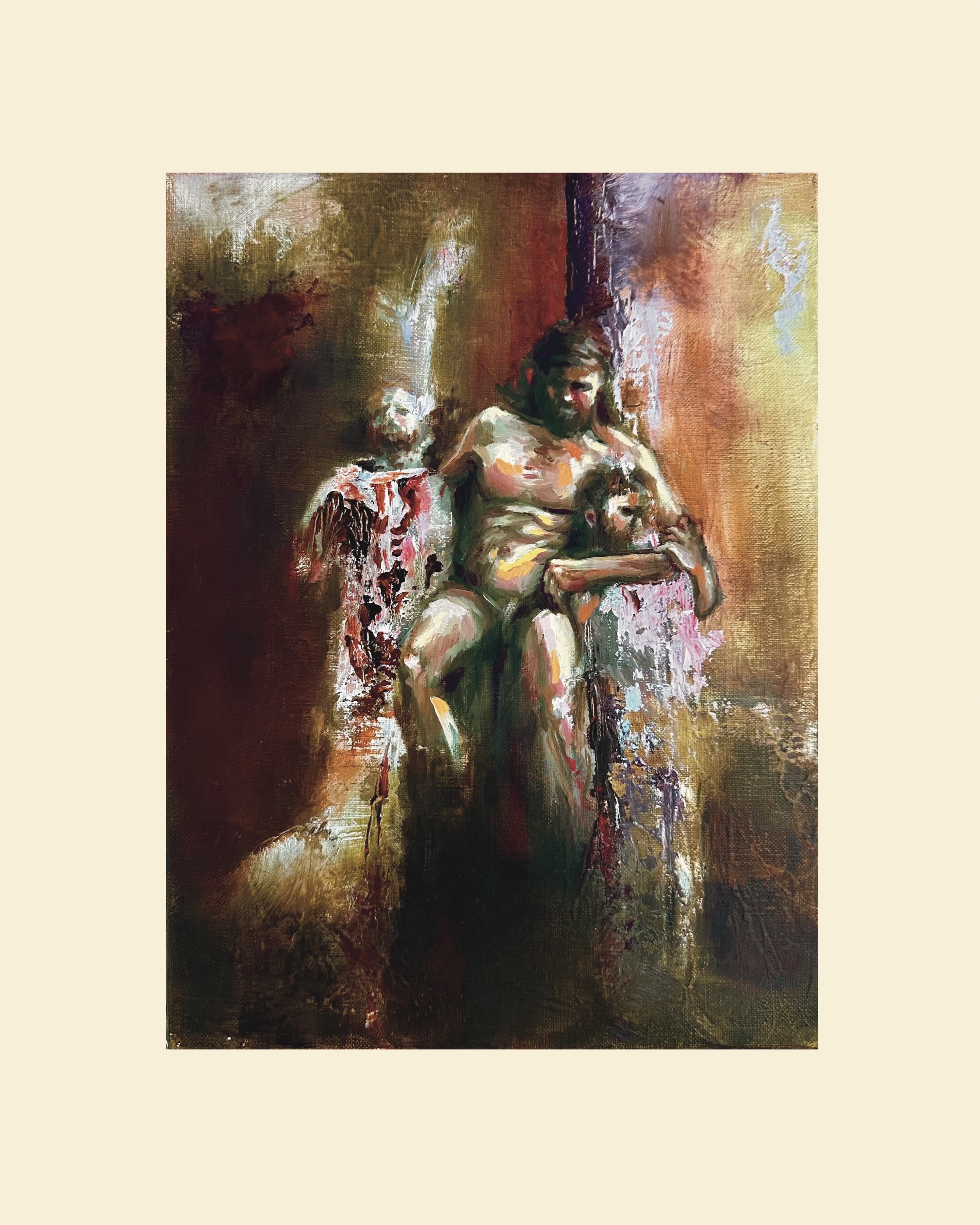


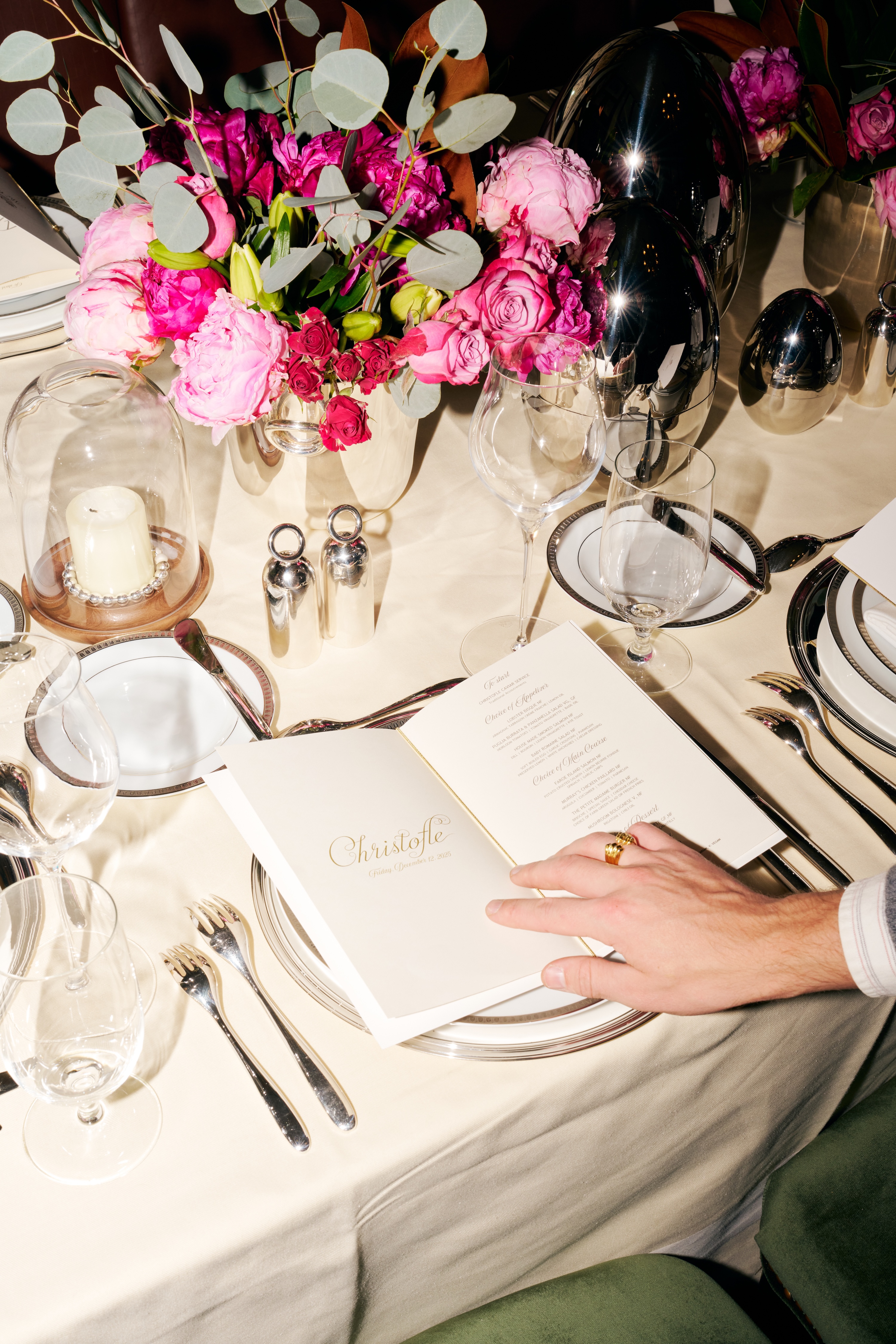

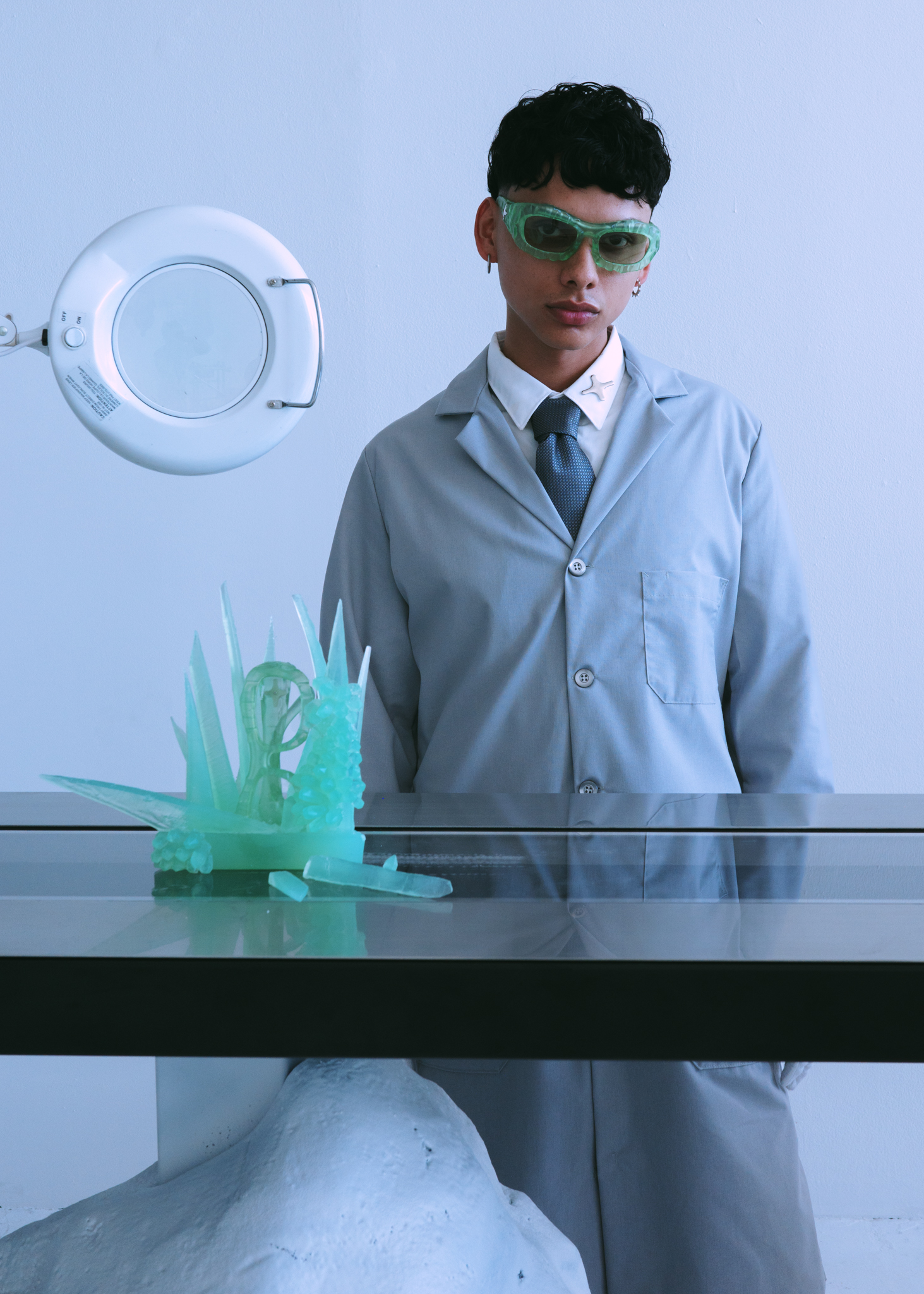


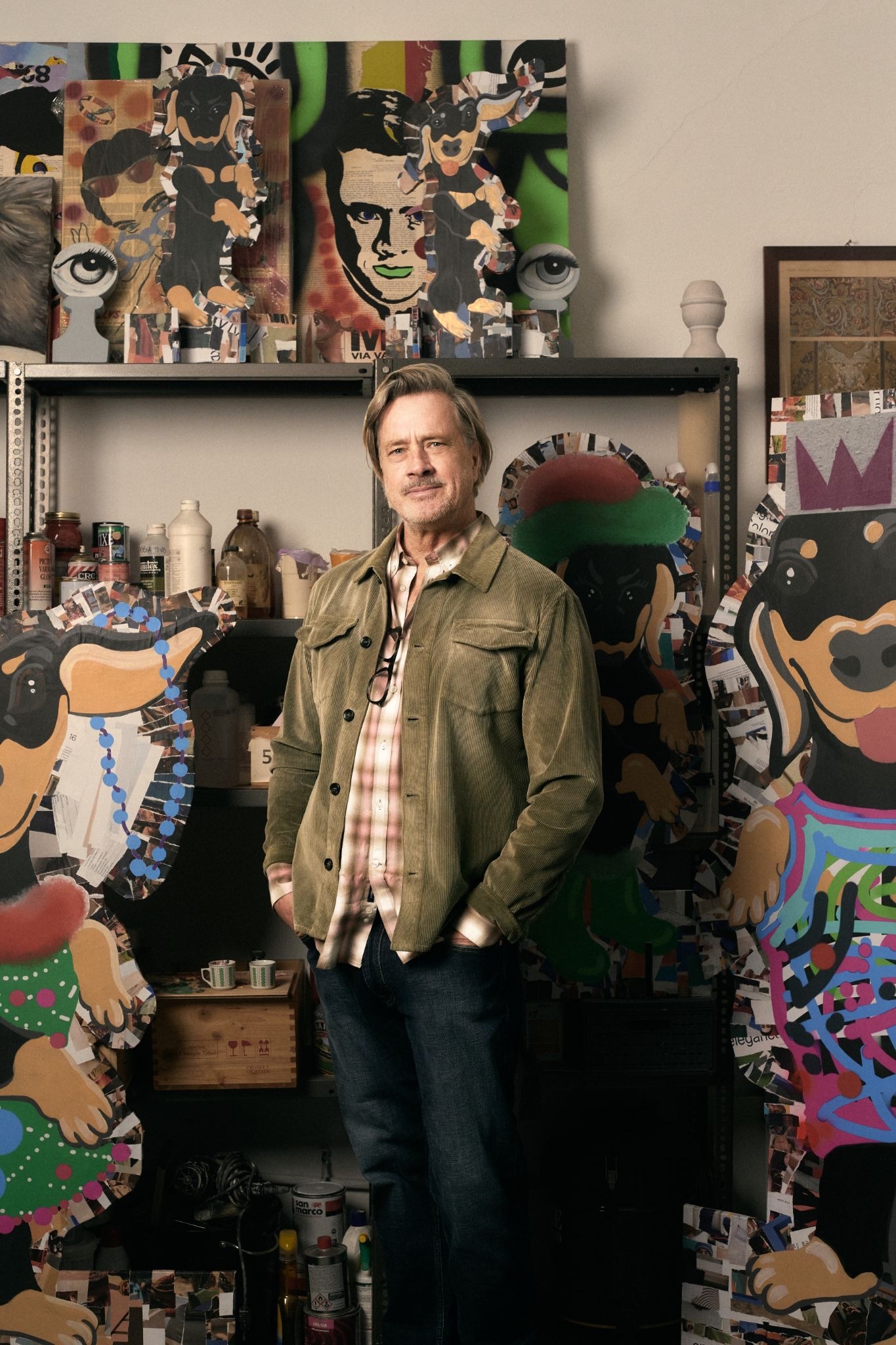
.JPG)
.jpg)

